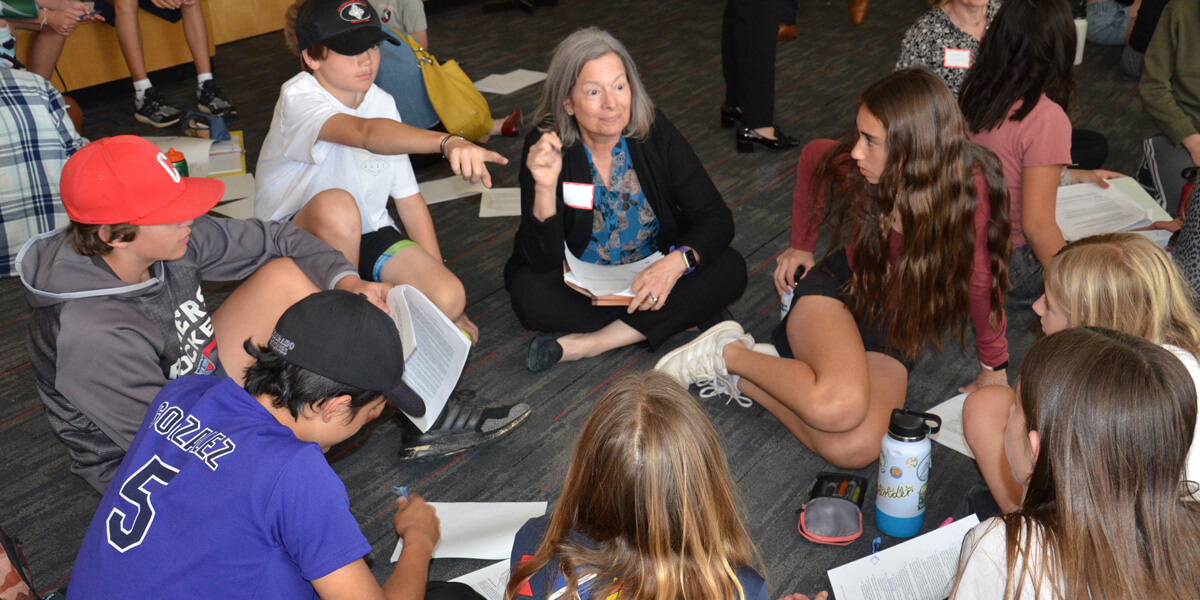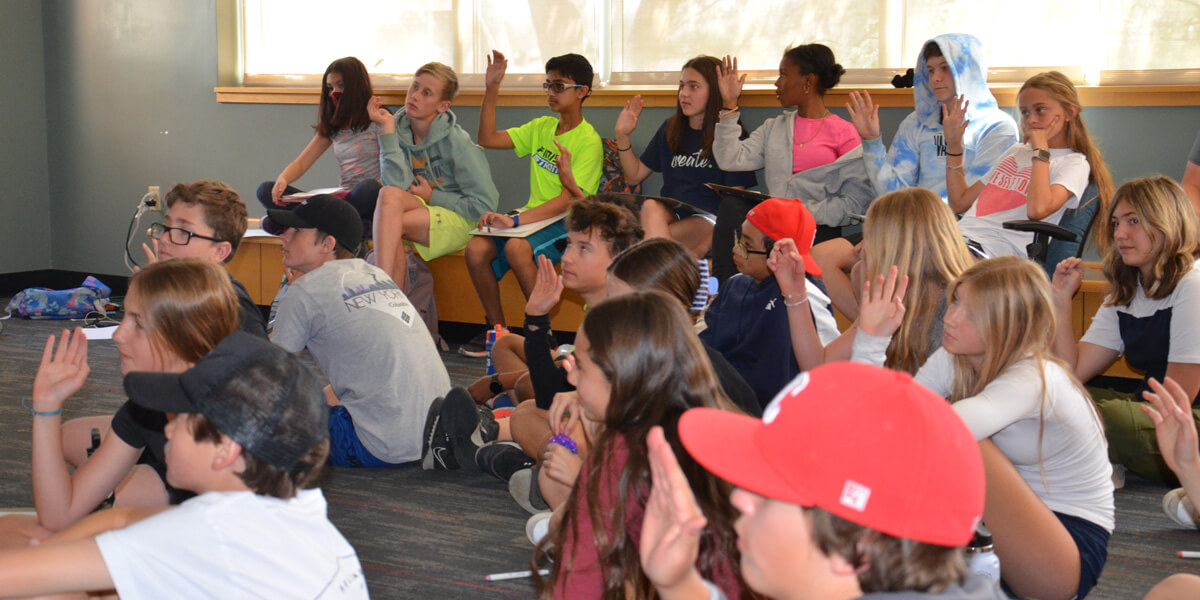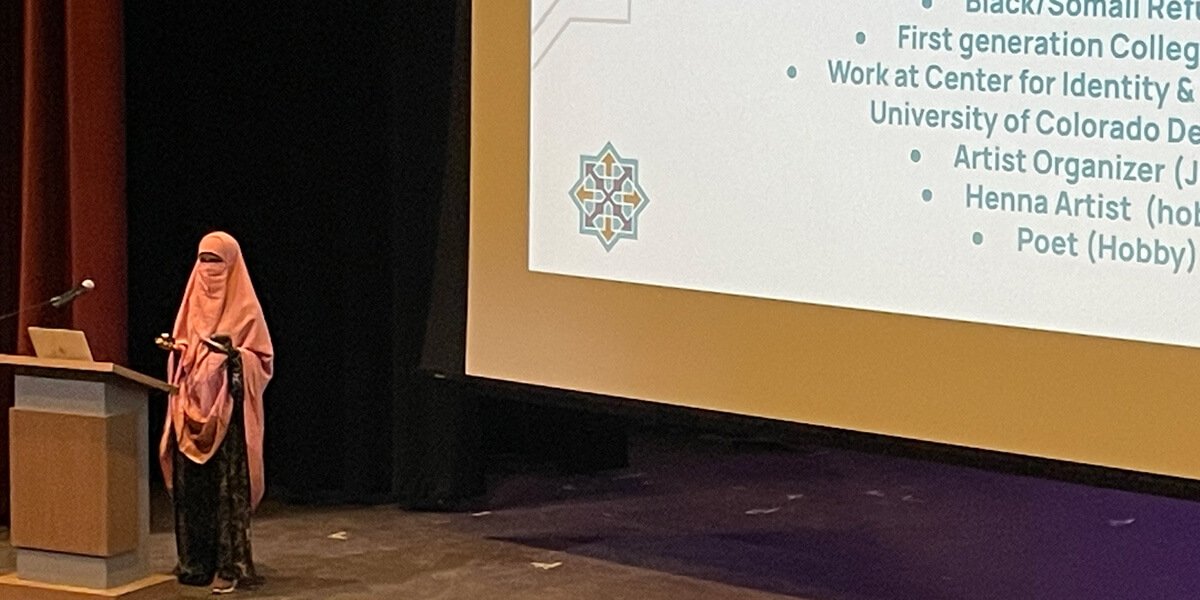New perspectives and lessons are giving Colorado Academy Middle School students experiences this spring that have left many with a greater appreciation of the world around them.
Level UP spotlights life of a refugee
Level UP returned to campus for its fourth year. The goal of this event is for Middle School students to share meaningful conversations from diverse perspectives. This year’s focus was on refugees. Spanish and civics teacher Sara Monterroso connected with the Colorado Refugee Speakers Bureau, and she and science teacher Kathleen Kirkman planned the event, with Enyi Jama as the keynote speaker. Jama shared a powerful story of leaving her home country of Somalia and spending six years in a refugee camp in Kenya before emigrating to the Denver area.
Jama credits her mother’s encouragement of education as the difference maker in her journey. Now in college at the University of Colorado Denver, Jama told students that her Middle School years were very difficult. She says she was bullied and made fun of for her accent and for wearing cultural clothing. But she found confidence and friends in high school, where she gained the strength and determination to speak up and share her experience with others.
Students had a chance to see how, with perseverance, one can achieve great success. One story Jama shared that stood out was that she doesn’t know her birthday—something our Sixth through Eighth Graders likely can’t imagine. She said when you are fighting for your life and trying to survive, thinking about birthdays isn’t among the first things that come to mind.
A poet and henna artist, Jama left the students with some advice on how to connect with other refugees in our community:
- Learn a few words of a refugee’s native language.
- Be kind and compassionate. Be an ally.
- Don’t ask a question that you wouldn’t want to be asked.
- Remember, everyone has their own story.
- Learn, ask appropriately, and listen.

Seventh Grade students tackle hate speech vs First Amendment rights
While Jama shared a personal experience of ignorance and hate, CA’s Seventh Graders tackled the subject of Hate Speech vs Free Speech in a unit offered for the first time this school year.
Social studies teachers Jessica Campbell, Forbes Cone, and Elisa Stolar led the students through weeks of study on hate speech and individual rights protected under the First Amendment. Students then had a chance to apply what they learned by participating in a mock trial led by the Colorado Lawyers Committee Hate Crime Education Program.
Students met with attorneys who walked them through state statutes on bias-motivated crimes. They presented a defense and prosecution in a case where a student reacted poorly after not being selected by his teacher for Math Student of the Year.

The Seventh Grade students served as the jury. Complete with raising a hand to be sworn in under oath, classes broke into groups to evaluate the evidence and decide whether the fictitious defendant was guilty of four counts of bias-motivated crimes. After some deliberation, students returned their verdicts.
Sophie Cox shared that the mock trial was a great way to see what she had learned in class applied to the real world. The unit, which included learning about the pyramid of hate, left an impression on her.
“It’s important to know this (hate crime) happens, and one day it could happen to you,” Sophie says. “It’s really important to have it on your radar.”
Gabriel Sung says he thought it was interesting how he and his classmates could see the structure of the court and how it works, and he liked how the mock trial fit into the unit.
“I could experience something that could be useful later in life. We may be called in to jury duty and need to know how to decide the verdict. Knowing this makes it better for the person on trial, because their fate depends on us,” says Gabriel.
Nathan Wedajo feels more prepared for the future, noting, “It’s good to be prepared for these types of situations.” When asked if talking about hate was difficult at a young age, he says, “It’s not too early; we’re at an age when you know wrong from right.”
Social studies teacher Cone says he believes that students now have a better understanding of the consequences for a community when forced to address hate. “While speech is protected and a sacred right that was baked into the foundation of our country, it’s critical that we treat it with reverence. Rights carry great responsibility,” says Cone.
